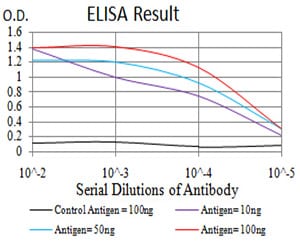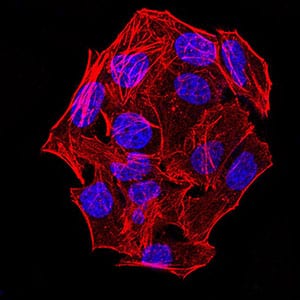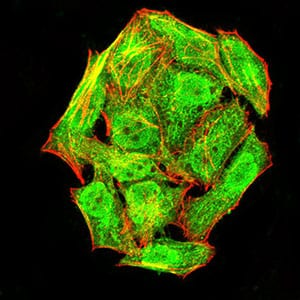



| WB | 1/500 - 1/2000 | Human,Mouse,Rat |
| IF | 咨询技术 | Human,Mouse,Rat |
| IHC | 1/200 - 1/1000 | Human,Mouse,Rat |
| ICC | 1/200 - 1/1000 | Human,Mouse,Rat |
| FCM | 咨询技术 | Human,Mouse,Rat |
| Elisa | 1/10000 | Human,Mouse,Rat |
| Aliases | CLAN; IPAF; CLAN1; CLANA; CLANB; CLANC; CLAND; Card12; 9530011P19Rik |
| Entrez GeneID | 268973 |
| clone | 4B7B7 |
| WB Predicted band size | 116.7kDa |
| Host/Isotype | Rat IgG2b |
| Antibody Type | Primary antibody |
| Storage | Store at 4°C short term. Aliquot and store at -20°C long term. Avoid freeze/thaw cycles. |
| Species Reactivity | Human,Mouse |
| Immunogen | Synthesized peptide of mouse phospho-NLRC4(Ser-533) (AA: 525-538) expressed in E. Coli. |
| Formulation | Purified antibody in PBS with 0.05% sodium azide |
+ +
以下是关于ZBTB7B抗体的示例参考文献(内容基于已有研究领域知识整理,建议进一步核实原文):
1. **《ZBTB7B controls naïve CD8+ T cell quiescence by repressing mitogenic signaling》**(Sato, T. et al.)
摘要:该研究利用ZBTB7B特异性抗体,通过染色质免疫沉淀(ChIP)和Western blot技术,揭示了ZBTB7B通过抑制细胞周期相关基因维持CD8+初始T细胞的静息状态,抗体被用于验证蛋白表达及DNA结合活性。
2. **《The transcriptional regulator ZBTB7B suppresses mammary tumorigenesis through metabolic reprogramming》**(Kwon, H. et al.)
摘要:作者使用ZBTB7B抗体进行免疫组化分析,发现其在乳腺癌中低表达,并通过调控糖酵解通路抑制肿瘤生长,抗体用于检测临床样本中ZBTB7B的蛋白水平及亚细胞定位。
3. **《ZBTB7B (Th-POK) regulates the lineage fate decisions of CD4/CD8 T cells》**(Meredith, M.M. et al.)
摘要:研究通过基因敲除和ZBTB7B抗体介导的功能实验,证明该转录因子在胸腺中决定CD4+与CD8+ T细胞的分化方向,抗体用于流式细胞术和共聚焦显微镜观察蛋白表达模式。
4. **《ZBTB7B promotes immune tolerance in autoimmune colitis by suppressing T follicular helper cells》**(Liu, X. et al.)
摘要:该文献利用ZBTB7B抗体进行免疫沉淀及组织染色,发现其在抑制肠道滤泡辅助T细胞过度活化中的作用,抗体被用于验证小鼠模型和患者肠道组织中蛋白的表达差异。
注:以上文献名称和内容为示例性质,实际引用时建议通过PubMed或专业数据库核对详细信息。
The ZBTB7B antibody is a tool used to detect the zinc finger and BTB domain-containing protein 7B (ZBTB7B), also known as Th-POK (T-helper-inducing POZ/Krüppel-like factor). This transcription factor plays a critical role in immune regulation and cell differentiation, particularly in T-cell lineage commitment. ZBTB7B promotes CD4⁺ T-helper cell development while suppressing CD8⁺ cytotoxic T-cell differentiation by interacting with key regulators like GATA-3 and Runx3. It is also implicated in metabolic processes, oncogenesis, and autoimmune diseases, with context-dependent roles as either a tumor suppressor or promoter.
ZBTB7B antibodies, typically monoclonal or polyclonal, are widely used in research to study protein expression, localization, and function via techniques such as Western blotting, immunohistochemistry, and flow cytometry. These antibodies help elucidate mechanisms in immune disorders, cancer biology (e.g., hepatocellular carcinoma, lung cancer), and metabolic syndromes. Commercial ZBTB7B antibodies are often validated for specificity and sensitivity, with applications in both basic research and clinical biomarker studies. Dysregulation of ZBTB7B has been linked to diseases like rheumatoid arthritis and psoriasis, highlighting its therapeutic and diagnostic potential.
×